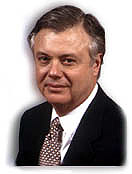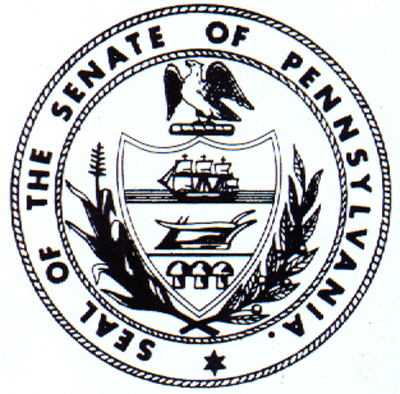|
|
||||||
FUM0 PROPOSES GRADUATED INCOME TAX FOR PROPERTY TAX CUTS HARRISBURG, January 30, 2006 – A tax increase on high-income Pennsylvanians would raise $750 million for immediate property tax relief, under a plan that state Senator Vince Fumo (D-Philadelphia) and other Senate Democrats announced today. About $262 million of the new revenue would be reimbursed by the federal government.When combined with revenue generated by slot machine gambling, the increase would permit at least $1.75 billion worth of property tax reduction. Fumo proposed creating three state Personal Income Tax (PIT) brackets, by raising the rate 1 ˝ percentage points to 4.57 percent on annual income above $250,000, and three percentage points to 6.07 percent on income above $400,000. The rate is currently 3.07 percent on all income. The increases would apply to less than 1.5 percent of income taxpayers, or 71,373 of the 5.65 million households in the commonwealth. "This is the fairest way to shift the tax burden away from real estate," Fumo said. "Unlike alternative proposals to increase the sales tax, which would disproportionately hurt the poor and cut into everyone’s property tax cut, a graduated personal income tax would affect only those relatively few who are most able to pay." Enactment of the plan would require a constitutional amendment to exempt the PIT from the uniformity clause in Article VIII. Fumo said that in order to provide property tax relief promptly, he would suggest that the legislature approve the PIT change under an emergency constitutional amendment provision contained in Article XI. By a two-thirds vote in both chambers, the legislature can amend the constitution immediately when the safety and welfare of the commonwealth of Pennsylvania is threatened, then submit that change to voters in a statewide referendum. "Many people have described our property tax situation as a crisis. When you have people, especially seniors citizens, threatened with the loss of their homes or a significantly reduced quality of life because of the property tax burden, I think that qualifies as an emergency," said Fumo, who hopes that the referendum could be placed on the ballot for this year’s primary election on May 16. While the money raised by the PIT and slot machine gambling would go to property tax cuts in all but one of the state’s school districts, it would go toward reducing the more burdensome wage tax in Philadelphia. Like the property tax in the rest of the state, the wage tax has long been the subject of reduction efforts in Philadelphia. The constitutional amendment would cap the highest bracket rate at no more than twice the base rate. For example, with the PIT currently at 3.07 percent for the lowest income levels, the top bracket could be no higher than 6.14 percent. Once the constitutional amendment passed, the legislature could then approve the graduated tax. Under Fumo’s proposal to raise $750 million, the rate would climb to 4.57 percent on income above $250,000 annually. A person making $300,000 per year, for example, would pay 3.07 percent on the first $250,000 and 4.57 percent on the next $50,000. That person’s tax liability would rise from $9,210 to $9,960, an increase of $750. Because state income taxes are deductible on federal tax returns, however, that taxpayer would effectively bear only about two-thirds of the increase, or $500. If that taxpayer received the average annual property tax reduction of $217 from the shift to income tax and another $289 from gambling revenue, he would have a net tax reduction of about $6. "This plan has many advantages over other proposals," Fumo said. "Unlike a sales tax increase, which impacts everyone including the poorest of the poor, this requires no tax increase for 98.5 percent of all Pennsylvanians. Unlike the sales tax, it does not shift any of the burden onto renters, who receive no benefit from property tax reduction. "Unlike other proposals, the federal government would pay for just under 35 percent of our shift away from property taxes. For those few whose taxes will rise, the federal government subsidizes a significant part of the cost," Fumo said. "So in the end, when combined with gambling revenue, we get $1.75 billion in property tax relief in exchange for just $488 million in un-reimbursed tax increases." Taxpayers in the top bracket would pay 3.07 percent on their first $250,000 of income, 4.57 percent on the next $150,000, and 6.07 percent on anything above $400,000. For someone making $500,000 per year, that would mean a jump in the annual PIT from $15,350 to $20,600, an increase of $5,250. That person, in the 35 percent federal bracket, would gain $1,837.50 in federal tax deductions, for a net tax increase of $3,412.50. If that person were to receive the average property tax cut, it would reduce the net increase to $2,906.50. Under a plan to raise the sales tax by a half percent point, every household in the state would pay an average of $133 in higher taxes, which would negate a substantial part of their property tax relief. If the Legislature declined to change the constitution under the emergency provisions in Article XI, the amendment would have to be approved by majority vote in the state House and Senate before the end of the 2005-06 legislative session, then pass again in the 2007-08 session. The earliest it could appear before the voters for approval in a referendum would be the May 2007 primary election ballot.
# # # Chart 1 -- Cost to Taxpayers, Sales Tax Increase vs. Graduated PIT. Chart 2 -- Pennsylvania Households, Sales Tax Increase vs. Graduated PIT. Chart 3 -- Net Benefits, Sales Tax vs. Graduated Income Tax Plan. |


